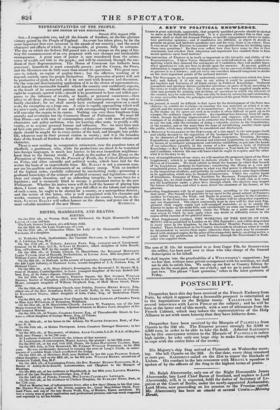A KEY TO POLITICAL KNOWLEDGE.
THERE is great solicitude, apparently, that properly qualified persons should be elected to serve in the Reformed Parliament. It is a question whether this or that cora. munity shall or shall not demand Pledges, or specific engagements always to main. tain particular opinions; and if candidates are diffident, or object to decide or promise on great and intricate questions now and for ever, there is an outcry. Does it ever occur to the Electors to consider their own qualifications for deciding upon these very questions ? Do they ever reflect how they have come to this or that conclusion, and whether their education and experience has enabled them to (dnn sound opinions upon bard matters? Timm instruction of Electors is in truth as important as the integrity and ability of the Representatives. Unless Voters themselves are well-informed on the subjects re- specting which they demand the sentiments of Candidates, they will neither know what questions to ask, nor how to decide upon time answers. At present, political information is supposed to come by inspiration,—for no one ever studies its elements or pursues it as a science ; and yet every one considers himself competent to decide on the most important points of the national interest.
Even The Newspaper, to be properly understood, requires a cultivation which few have had ; and, indeed, it is not easy to say where it could be procured. There arc teachers and lecturers of all kinds except in Political Knowledge. Ordinary journalists and speakers discuss particular questions, or parts of them, according to the views or wants of the nay; but there are none who have supplied ample mate- rials and grounds for judging and deciding all questions in which the interests of the country may be concerned. This can only be done by arranging and condensing, in some accessible form, the principles and practice of the great State business, as it is conducted, in any journal, it would be difficult to find space for the development of the State ma. chmery—to exhibit its working—to examine the raw material on which it is em- ployed, and the nature and uses of its manufacture. In the SPECTATOR, large as it is, the claims on its space are such as to render it often difficult to pack up in its columns the ordinary supply of matter. An expedient has, however, been hit upon. . which, though involving unprecedented labour and expense, still promises ad- vantages of so striking a nature as to authorize the Proprietors of the SPECTATOR to run the risk, with the certainty of doing a valuable service to the Constituency of the country, and at the same time the hope of establishing another claim upon the public, which may ultimately be considered and discharged. In a Morrimr SUPPLEMENT to the SPECTATOR, of a size equal to the newspaper itself, and wholly devoted to the exposition of the business of the House of Commons. in its character of the grand tribunal of Trade, Commerce, Taxation, Revenue. Expenditure, and generally of internal and external Legislation, we shall be able, by means of systematic arrangement and tabular exhibition, to put into the hands of our subscribers (gratis), in the course of a few months, a hotly of Political Knowledge—a Key to Parliamentary Information—a Text-book for both Elector and Candidate, wherein the one will learn what he ought to require, and the other what it is his duty to do. By way ofexemplification of our views, we will mention the proposed object of the First Supplement; which it is intended to dedicate wholly to THE WORKING or THE House or Commons. We shall exhibit in detail the manner in which that branch of the Legislature performs its functions: considering the House as a vast and complicated power, we shall examine in what way that power is effectually applied to the transaction of affairs, and probably be enabled to suggest some improvement in its application, which may be deemed of importance. Under the various heads of Attendance, Economy of Time, Facilities for Business, Promulgation of Pro- ceedings, &c., we shall render the House transparent to the world, and, as it were, put the Legislature under a glass hive, through which the observer may inspect the labour of his bees, and what is more, detect the slumbers of his drones, at his pleasure. Succeeding Supplements will be of equal importance, according to the opportunities that occur. The Second will probably be set apart to the grand subject of Finance; another to Currency, the Bank, and Banks in general; another to tho.Colonies ; another to the Corn-laws, and so on. The manner will be altogether expository, and not dogmatical. The object continually kept in view will he, that each Sup- plement shall supply ample and wellananged materials, so as to enable the Elector to make up his mind fully and satisfactorily on some one branch of Politi- cal Knowledge, and subsequently retain the Whole, as a guide and friend of easy access, to which he may apply when any doubt or difficulty occurs in the course of the exercise of his political duties. The First Supplement (subject, THE WORKING OF THE HOUSE OF COM- MONS) will be published in London oa the 29th September; and willbe despatched to every town in the kingdom, by the Booksellers' Monthly Parcels, on the 1st October. Those Subscribers in the Country who reside in situations where it would. be inconvenient to receive their copies otherwise than by post, may be accommo- dated with stamped copies, for the price of the stamp-duty merely, on giving notice, a week before the publication of each Number, through the Newsvender or Book- seller uho supplies them.


























 Previous page
Previous page